- Author Arianna Cook cook@women-community.com.
- Public 2024-01-12 17:55.
- Last modified 2025-01-23 09:40.
Composition and calorie content of black tea. Useful properties and possible contraindications of the drink. How to choose the right and how to brew black tea? Features of use.
Black tea is, without exaggeration, the most popular drink on earth. Even coffee, so dearly loved by mankind, is only in second place! It is estimated that over 2 billion cups of this calming, invigorating, refreshing, warming, inspiring drink are consumed every day in the world! Let's try to figure out what is his secret?
Composition and calorie content of black tea
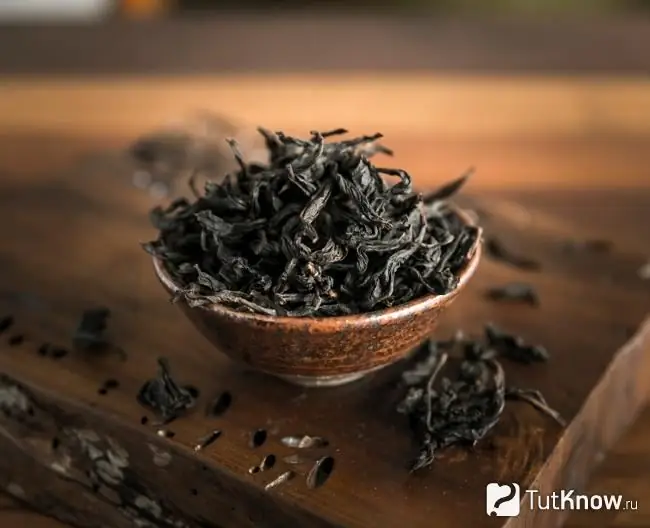
Pictured is black tea
Surprisingly, black and green tea is obtained from the same bush! In both cases, the plant Camellia Sinensis or Camellia Chinese is the source for the aromatic drink. It's just that once the observant sons of the Celestial Empire noticed that after the fermentation process begins in the leaves of green tea damp due to an oversight, the drink brewed with their help acquires a different color, aroma and a whole bunch of new tastes.
Since then, the gourmet society has split into two camps:
- The first ones, who prefer green tea, advocate the preservation of its natural, pristine taste and closely monitor that the leaves do not undergo oxidation processes during drying (rare varieties of green tea allow fermentation, but not more than 2-3%);
- The second, fans of black tea, experiment with various types of withering, drying and curling of leaves, creating bright bouquets of aromas and tastes. To date, more than 2000 varieties of black tea are known!
Note! American actress Kathleen Turner has repeatedly argued that a real tea bouquet is like an expensive wine: only an author who knows all the secrets of making a drink can repeat it.
By itself, even very strong black tea has almost zero calories. In 100 g of dry product, you can hardly find 1 kilocalorie, and in a cup of freshly brewed drink you will not find them at all.
However, let's be honest: very few people drink pure black tea. And as soon as you reach out for sugar, milk or, what good, condensed milk, this is where calories appear.
The calorie content of black tea is presented in the table:
| Type of drink | Energy value per 100 ml, kcal |
| Black tea without sugar or other additives | 0-1 depending on the strength |
| Black tea with bergamot, oregano, mint, currant leaves, thyme | 2-3 |
| Black tea with berries (honeysuckle, currants, raspberries) | 3-4 |
| Black tea with lemon (1-2 wedges) | 4-5 |
| Black tea with natural honey (1 tsp) | 25 |
| Low fat black tea with milk (3 tablespoons) | 35 |
| Black tea with sugar (2 tsp) | 65 |
| Black tea with condensed milk (2 tsp) | 80 |
Thus, the calorie content of black tea allows you to safely drink several cups of unsweetened drink a day, flavored with lemon, herbs and berries, without risking your waist and getting a lot of useful substances. By the way, which ones?
Numerous studies of the popular drink have shown that it is able not only to give pleasure, but also to be beneficial due to the collection of medicinal compounds contained in the leaves.
For example, black tea contains vitamins A, B1, B2, B15, C, K, P, PP, each of which performs its own function in the body. Some have a beneficial effect on the nervous system, others are involved in the processes of hematopoiesis, others regulate the activity of the adrenal glands, the fourth lower cholesterol levels, and the fifth help the absorption of nutrients. Of course, one cup by itself will not affect your well-being, but regular use of a healing drink will allow you to constantly supply the body with more and more portions of vitamins.
The health benefits of black tea are also due to the presence of minerals in it. Depending on the variety, you can find here manganese, zinc, copper, nickel, calcium, magnesium, iron, sodium, sulfur, cobalt, molybdenum, chromium, selenium, iodine and fluorine, with the first four being absorbed especially well.
No less interesting is the presence of polyphenols in fermented tea leaves - substances with an antitumor effect. As an example of one of the curious studies on this topic, we can cite the results of monitoring the health of women in the "tea Mecca" of China, Fujian province, which showed that women living here are three times less likely to become victims of breast cancer than other women. Of course, one should not consider a flavored drink as a cure for oncology, but it is quite reasonable to use it as a pleasant and easy means of prevention.
Not deprived of your favorite drink and amino acids, which are not only engaged in the human body: they support the muscular and nervous system, participate in the control of metabolism, the production of hormones and, best of all, slow down the aging process.
The catechins present in tea also help to preserve youth, which accelerate the elimination of free radicals from the body, and simultaneously prevent several dozen diseases. Suffice it to say that catechins help our bodies fight diabetes by regulating blood sugar levels.
Finally, black tea contains tannins that strengthen blood vessels, accelerate blood clotting and wound healing, as well as promote the removal of heavy metals from the body.
Last but not least, black tea leaves store theine tea caffeine. Like its brighter counterpart from a coffee cup, theine has an effect on the functioning of the central nervous system and heart, helps to cheer up, and tones a person. True, unlike (we apologize for the tautology) coffee caffeine, which is considered an aphrodisiac, tea theine has got the title of a stimulant. That is, its effect is less pronounced, although people with increased sensitivity will feel it.
Useful properties of black tea
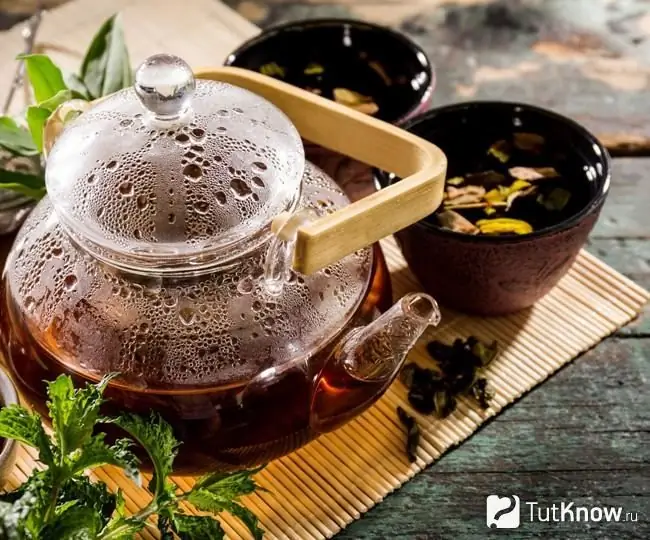
Since ancient times, the Japanese have believed that black tea adds wisdom to a person and drives out diseases. Modern scientists believe that at least there is some truth in this statement. Tea is not addictive, does not suit the body with shakes, as coffee is too active in this regard, does not harm, provided that you do not overdo it with it.
Moreover, tea really makes us wiser! This was established by scientists in Tokyo, finding that drinking 3 cups of tea a day stimulates alpha brain waves, forcing it to reach its full potential, and helps to focus on solving a specific task, regardless of external stimuli. So the next time you feel like you're hitting a wall and don't know what to do, just take a little time out and have a cup of tea. Chances are high that the solution will be found as if by itself.
What else is black tea useful for:
- Prevents tooth decay … Calcium is to blame for this, which strengthens all bones, in principle, and teeth in particular, and also helps to align the enamel.
- Cleans the body of harmful substances … For this it is worth saying thank you to the useful components of the drink, which drive free radicals with heavy metals from the body, and vitamins, which normalize the work of the urinary system.
- Relieves headache … The caffeine tannin in black tea works as a mild pain reliever and can often help relieve problems, especially if they are related to pressure fluctuations or fatigue. However, frequent and prolonged ailments are a reason for a visit to the doctor, and not to the kitchen.
- Lowers blood pressure … Recently, a study published in the Nutrition Review showed that people who drank two cups of tea a day for three months in a row had a 2-4mm reduction in blood pressure. rt. Art., and this was true for both the black and green "version" of the drink! However, it is important to know when to stop, because it often happens that instead of the expected effect, black tea increases blood pressure if consumed uncontrollably.
- Protects the heart … One of the most important properties of black tea is its ability to reduce the likelihood of developing cardiovascular disease, which is facilitated by a special group of antioxidants called flavonoids. For example, according to the observations of Swedish scientists, tea drinkers are 32% less likely to have strokes.
- Promotes weight loss … The fact is that the polyphenols already familiar to us have a beneficial effect on the metabolism of the liver and microflora of the small intestine, facilitating the process of losing weight. In addition, a drink with a scanty calorie content can serve as an excellent substitute for a snack and it is good to dull hunger.
- Fights stress, depression, overwork … There is a reason why clever Japanese people pay such attention to the tea ceremony! It has been proven that unhurried, measured movements, watching the slowly boiling water and a cheerful dance of tea leaves free the soul from the hardships of the past day and give peace. No, we are not encouraging you to buy a kimono and immediately immerse yourself in the intricacies of Japanese culture. But turning tea drinking into a personal little meditation, during which you will not think about anything else, relishing the aroma and taste of black tea, will be very useful. As they say, and let the whole world wait!
Note! Like any product on the planet, black tea remains healthy only when you control its consumption. To meet with a fragrant drink bring only joy, try to adhere to the norm of 2-3200 gram cups per day.
Contraindications and harm of black tea

Moderate consumption of the drink does not always help. For some people, due to their physiological characteristics or the state of the body (pregnancy, lactation), it is better, in principle, to stay away from it or strictly dose its use.
What is the harm of black tea:
- Tannin interferes with the absorption of iron. That is why the instructions for some, albeit very few, drugs are written "Do not drink tea."
- Although theine is considered less aphrodisiac than caffeine, it can cause insomnia, migraines, and irritability in certain individuals.
- Theine also increases eye pressure. For a healthy person, its effect will go unnoticed, but people with glaucoma may feel a deterioration in their condition.
- It is undesirable to abuse tea during colds, flu and other ailments accompanied by high fever and taking medications. The diuretic effect of the theophylline substance accelerates the withdrawal of fluids from the body, which can negate the result of their use.
- Kidney disease, gastritis or ulcers are unambiguous contraindications for tea. In the first case, it will increase urination and the load on the diseased organ in the second - it will have a bad effect on the state of the gastrointestinal tract.
- Pregnancy and lactation are two more good reasons to temporarily stop drinking tea leaves. No, the expectant mother herself will hardly feel unwell, but her baby can be harmed by caffeine, which excites the nervous system. In theory, a woman can afford a cup of lightly brewed and / or diluted with milk tea, but it is better to first consult a doctor about this.
Note! Drink strictly freshly brewed tea. Having stood in a warm room for several hours, it is highly likely to acquire unwanted impurities in the form of mold spores or pathogenic bacteria. By the way, this rule always applies, regardless of whether you are brewing red, yellow, white, black or green tea.
How to choose black tea?
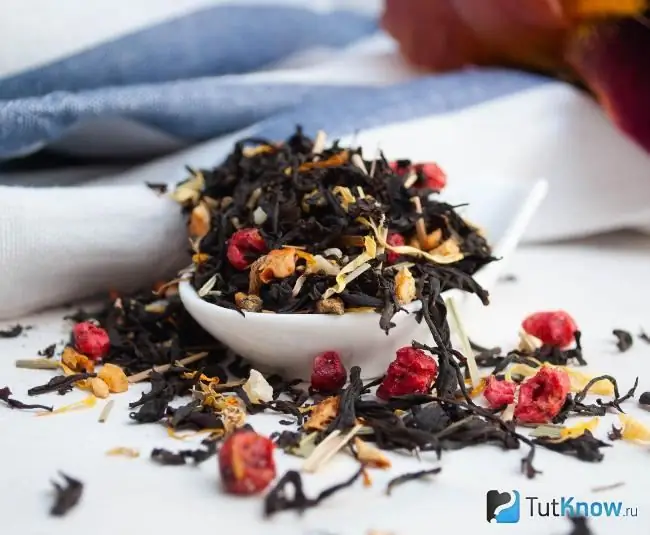
In the photo, black tea with additives
Sir William Gladstone, Prime Minister of Great Britain, said in the distant 19th century that tea can warm a frozen person, cool a person suffering from heat, cheer up a sad person and calm an agitated person. However, all this can only be done by a good drink, such a feat is beyond the power of random crumpled leaves! Therefore, one must be able to choose and buy black tea of really worthwhile quality.
First of all, it makes sense to pay attention to the country of origin. Despite the fact that today at least three dozen countries are engaged in the production of black tea, China still holds the palm, supplying more than a quarter of all tea sold in the world to the world market. In addition, some especially valuable varieties can only be purchased from traders in the Middle Kingdom: for example, real black pu-erh or oolong tea is not produced anywhere else in the world.
No luck with China, head to the shelf with goods from India and the former Ceylon, now Sri Lanka. Here, too, you can find very, very good varieties of your favorite drink.
Much more modest tea producers, which nevertheless supply an excellent product, are Japan and some African countries. But it will take experience to choose the really good varieties of your favorite drink among their products.
What to look for when choosing:
| Types of black tea | Characteristic |
| Whole leaf | OP is the highest category of black tea. For brewing, only the two top leaves are taken from each branch of the tea bush and strictly after the buds open. |
| P - the raw material is whole leaves from the second or third pair on the branch, slightly denser and stiffer than the top ones. | |
| OPA is a large leaf black tea made from whole leaves with a slightly irregular twist. | |
| FOP is an analogue of the OP category, containing unblown buds that give the drink a delicate floral taste. | |
| From broken leaves | Poor quality product, often with litter. |
| Granulated | Tea made from leaves deliberately broken and rolled into granules. |
| Packaged | The lowest grade of tea, for the production of which waste of tea leaves is used. |
| Pressed | It is made from the leaves of the old harvest with leaves and particles of twigs of young tea bushes. |
The labeling on tea packages may vary from country to country. Japan, for example, uses numbers to indicate quality: up to 100 is bad, from 100 to 200 is an average category, above 300 is elite drinks. In China, there is also a digital scale, where 7 means the worst kind of tea, 1 - excellent, and if you come across the word Extra, you cannot wish for the best!
| The best black teas in the world | Characteristic |
| Assam | Indian tea, often granulated, with light honey and nut aromas. Top quality products are harvested in the spring and summer and are marked with FTGFOP on the packaging. |
| Darjeeling | Collection is awarded only to the upper young leaves with a bud. It is no coincidence that this black tea was dubbed “tea champagne” by connoisseurs: according to the assurances of gourmets, it has a slight aftertaste of wine and a delicate fresh aroma. |
| Ceylon | The right to be called "black Ceylon tea" belongs to 6 types of drink at once, each of which has its own taste, aroma and other characteristics. Interesting, for example, is the Broken variety, surprisingly strong and fragrant. They say that sometimes even coffee is inferior to him! |
| Kenyan | One of the youngest suppliers of tea, Kenya, is confidently conquering the world market, although some consider its drinks bitter and often use them to create blends. |
| Puer | This tea is extremely difficult to produce and has a not too pleasant aroma, which in the Celestial Empire is called the "Noble Smell of the Old House." Not everyone will be able to appreciate it, so you will have to take the word of connoisseurs and the fact that the price of black tea of this variety is sometimes simply off scale. |
How to brew black tea correctly?
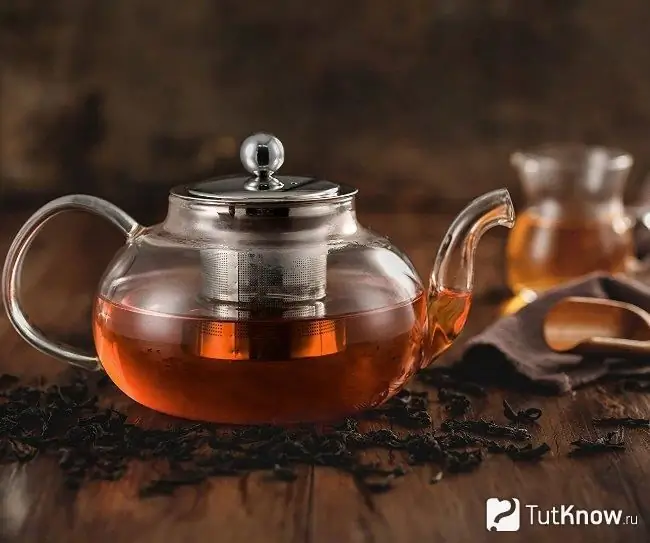
It would seem that the brewing process does not conceal any special intricacies."Yes, there is no such person in the world who would not know how to brew black tea!" - you say, and you will be wrong. Because between dry leaves drenched in boiling water and the process of making real, fragrant, tasty tea there is a real abyss!
Ingredients:
- Black leaf tea - 1 tsp
- Water - 200-400 ml
Step by step preparation of black tea:
- Pour some boiling water into an empty kettle, let it sit for a few seconds and pour gently. In a heated teapot, tea leaves will reveal their taste to the fullest.
- Place the tea leaves in the kettle.
- Fill it with a little water. The ideal temperature is 90-95 ° C, so it will be just fine if you don't use boiling water.
- As soon as the tea leaves begin to swell, top up the kettle almost to the top and cover with a lid.
- After 5 minutes, you can pour the tea into the cups.
Note! Tea should be brewed in a glass or ceramic teapot; it is these materials that contribute to achieving the ideal result.
How to drink black tea properly?
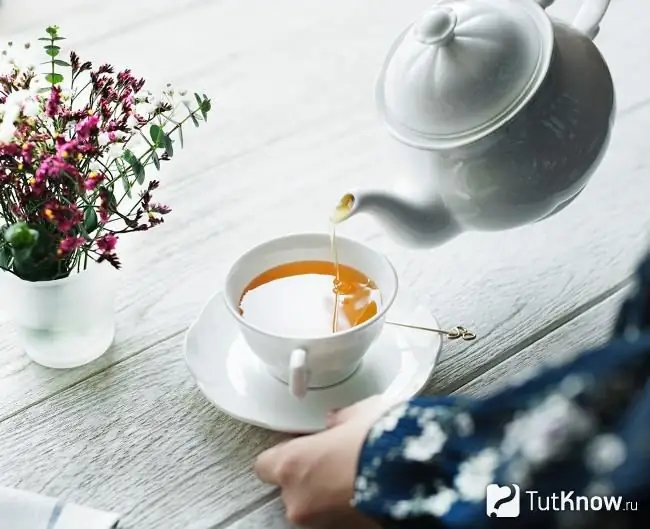
No, this is not about the tea ceremony again. We just want to show you how to make sure that you can fully enjoy this wonderful drink and get all the possible benefit from it.
Ideal Tea Rules:
- Let it really be a tea party, and not the finale of a big meal. It is better to drink food with water, so it is better absorbed, and set aside a separate time for tea. Remember what we said about depression and meditation?
- Try not to drink tea that is too strong or too hot. Both are not at all harmless to health.
- Don't drink tea instead of breakfast! Firstly, on an empty stomach after sleep, it can act annoyingly, and secondly, it is simply necessary to eat something more or less satisfying in the morning.
- When the infusion comes to an end, do not add boiling water to it! Wash the kettle and brew the drink again.
- Do not leave the tea for too long, otherwise it will be overly strong.
Note! Black tea bags are considered not only low-grade, but also unsafe. And the point here is not that they are too often filled with remnants of raw materials mixed with litter, which were used to make leaf tea. The sachets themselves are far from ideal: for reliability, thermoplastic fibers and glue are often added to them, which certainly will not make the drink better or healthier.
Watch a video about the benefits and dangers of black tea:






